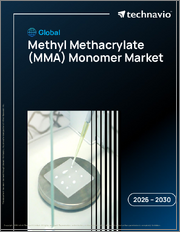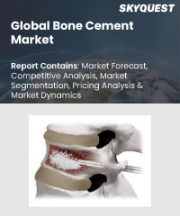
|
시장보고서
상품코드
1670388
폴리메틸메타크릴레이트 시장 규모, 점유율, 성장 분석 : 등급별, 형태별, 최종 이용 산업별, 지역별 - 산업 예측(2025-2032년)Polymethyl Methacrylate Market Size, Share, and Growth Analysis, By Grade (General-Purpose Grade, Optical Grade), By Form (Extruded Sheets, Cast Acrylic Sheets), By End-Use Industry, By Region - Industry Forecast 2025-2032 |
||||||
폴리메틸메타크릴레이트 시장 규모는 2023년 48억 달러로 평가되며, 2024년 50억 5,000만 달러에서 2032년 75억 8,000만 달러로 성장하여 예측 기간(2025-2032년) 동안 5.2%의 CAGR로 성장할 것으로 예상됩니다.
폴리메틸메타크릴레이트(PMMA)는 뛰어난 투명성, 내구성, 비용 효율성으로 인해 다양한 산업 분야에서 유리를 대체할 수 있는 우수한 대안으로 떠오르고 있습니다. 그 다재다능함으로 수족관, 광학유리, LCD 패널, 자동차 부품 등에 적용이 가능하며, 이들 분야의 수요를 견인하고 있습니다. 최근 PMMA의 가격은 자외선 차단, 재활용 가능한 소재로 만들어져 엄격한 환경 기준을 준수하는 등 유리한 특성으로 인해 시장 수요가 증가함에 따라 가격이 상승하고 있습니다. 지속가능한 폴리머에 대한 추세는 바이오 기반 원료를 장려하는 정부의 적극적인 노력에 의해 더욱 촉진되고 있습니다. 재생 가능 제품에 대한 투자와 중합 기술 혁신은 시장 성장 잠재력과 소비자의 기대에 부응하는 PMMA의 지속적인 진화를 보여주고 있습니다.
목차
소개
- 조사 목적
- 조사 범위
- 정의
조사 방법
- 정보 조달
- 2차와 1차 데이터 방법
- 시장 규모 예측
- 시장 가정과 제한
주요 요약
- 세계 시장 전망
- 공급과 수요 동향 분석
- 부문별 기회 분석
시장 역학과 전망
- 시장 개요
- 시장 규모
- 시장 역학
- 성장 촉진요인과 기회
- 성장 억제요인과 과제
- Porters 분석
주요 시장 인사이트
- 핵심성공요인
- 경쟁 정도
- 주요 투자 기회
- 시장 생태계
- 시장 매력 지수(2024년)
- PESTEL 분석
- 거시경제 지표
- 밸류체인 분석
- 가격 분석
- 기술 분석
- 특허 분석
- 사례 연구
- 고객과 구매 기준 분석
폴리메틸메타크릴레이트 시장 규모 : 등급별 & CAGR(2025-2032년)
- 시장 개요
- 범용 등급
- 광학 등급
폴리메틸메타크릴레이트 시장 규모 : 형태별 & CAGR(2025-2032년)
- 시장 개요
- 압출 시트
- 캐스트 아크릴 시트
- 펠릿
- 비즈
- 기타 형태
폴리메틸메타크릴레이트 시장 규모 : 최종 이용 산업별 & CAGR(2025-2032년)
- 시장 개요
- 싸인 및 디스플레이
- 표지
- 디스플레이 보드
- POS 보드
- 건설
- 최종 용도
- 주거용
- 다세대 주택
- 상업용
- 산업용
- 유형
- 장벽
- 바닥재
- 페인트와 코팅
- 자동차
- 자동차 부품·액세서리
- 몸 부위
- 램프 커버
- 내장·외장 트림
- 차종
- 승용차
- 소형 상용차
- 대형 상용차
- 쿼드/ATV & 사이드 바이 사이드
- 스노모빌
- 레크리에이션용 차량
- 연료 종류
- 내연기관차(가솔린, 디젤, 기타)
- 전기자동차
- 조명기구
- 라이트 가이드 패널
- 태양광발전 설비
- 전자기기
- 휴대폰 태블릿 액정화면
- 기타 전자 용도
- 해양
- 액세서리와 파트
- 내장 표면 마감
- 콘솔
- 유리와 창문
- 싱크
- 샤워 팬
- 카운터톱
- 벽 클래딩
- 선외기 커버
- 휴대용 테이블
- 기타 액세서리와 부품, 유형
- 수상 모터사이클
- 상업용
- 스포츠 수상 모터사이클/제트 스키
- 헬스케어
- 헬스케어 기기
- 가구
- 벽 클래딩
- 위생 기구
- 기타 헬스케어 용도
- 농업
- 유리와 창문
- 농업기계·차량
- 소비재
- 가정용품
- 기타 소비재 용도
- 기타 최종 이용 산업
폴리메틸메타크릴레이트 시장 규모 : 지역별 & CAGR(2025-2032년)
- 북미
- 미국
- 캐나다
- 유럽
- 독일
- 스페인
- 프랑스
- 영국
- 이탈리아
- 기타 유럽
- 아시아태평양
- 중국
- 인도
- 일본
- 한국
- 기타 아시아태평양
- 라틴아메리카
- 브라질
- 기타 라틴아메리카
- 중동 및 아프리카
- GCC 국가
- 남아프리카공화국
- 기타 중동 및 아프리카
경쟁 정보
- 상위 5개사의 비교
- 주요 기업의 시장 포지셔닝(2024년)
- 주요 시장 기업이 채용한 전략
- 최근의 시장 동향
- 기업의 시장 점유율 분석(2024년)
- 주요 기업 개요
- 기업 상세
- 제품 포트폴리오 분석
- 기업 부문별 점유율 분석
- 매출 전년비 비교(2022-2024년)
주요 기업 개요
- Sumitomo Chemical Co., Ltd.(Japan)
- Evonik Industries AG(Germany)
- Arkema S.A.(France)
- LG Chem Ltd.(South Korea)
- Chi Mei Corporation(Taiwan)
- Kuraray Co., Ltd.(Japan)
- Asahi Kasei Corporation(Japan)
- Plaskolite, LLC(United States)
- Altuglas International(Arkema Group)(France)
- Shanghai Jingqi Polymer Science Co., Ltd.(China)
- Gevacril GmbH(Germany)
- Perspex International(Lucite International Group)(United Kingdom)
- PPG Industries, Inc.(United States)
- Gehr Plastics, Inc.(United States)
- Polycasa N.V.(Belgium)
결론과 제안
ksm 25.04.10Polymethyl Methacrylate Market size was valued at USD 4.8 billion in 2023 and is poised to grow from USD 5.05 billion in 2024 to USD 7.58 billion by 2032, growing at a CAGR of 5.2% during the forecast period (2025-2032).
Polymethyl methacrylate (PMMA) is emerging as a superior alternative to glass across various industries due to its exceptional transparency, durability, and cost-effectiveness. Its versatility allows for applications in aquariums, optical glasses, LCD panels, and automotive components, driving demand in these sectors. Recently, PMMA prices have increased amid rising market demands, owing to its advantageous properties, including UV protection and compliance with strict environmental standards, as it is made from recyclable materials. The trend towards sustainable polymers has been further propelled by supportive government initiatives promoting bio-based raw materials, which can reduce industrial energy consumption significantly. Current investments in renewable products and innovations in polymerization techniques indicate strong market growth potential and the continuous evolution of PMMA to meet consumer expectations.
Top-down and bottom-up approaches were used to estimate and validate the size of the Polymethyl Methacrylate market and to estimate the size of various other dependent submarkets. The research methodology used to estimate the market size includes the following details: The key players in the market were identified through secondary research, and their market shares in the respective regions were determined through primary and secondary research. This entire procedure includes the study of the annual and financial reports of the top market players and extensive interviews for key insights from industry leaders such as CEOs, VPs, directors, and marketing executives. All percentage shares split, and breakdowns were determined using secondary sources and verified through Primary sources. All possible parameters that affect the markets covered in this research study have been accounted for, viewed in extensive detail, verified through primary research, and analyzed to get the final quantitative and qualitative data.
Polymethyl Methacrylate Market Segments Analysis
Polymethyl Methacrylate Market is segmented by Grade, Form, End-Use Industry and region. Based on Grade, the market is segmented into General-Purpose Grade and Optical Grade. Based on Form, the market is segmented into Extruded Sheets, Cast Acrylic Sheets, Pellets, Beads and Other Forms. Based on End-Use Industry, the market is segmented into Signs & Displays, Construction, Automotive, Lighting Fixtures, Electronics, Marine, Healthcare, Agriculture, Consumer Goods and Other End-Use Industries. Based on region, the market is segmented into North America, Europe, Asia Pacific, Latin America and Middle East & Africa.
Driver of the Polymethyl Methacrylate Market
The polymethyl methacrylate (PMMA) market is being primarily propelled by an increasing demand for affordable, damage-resistant transparent materials across various industries. PMMA is particularly sought after due to the robust growth in end-user sectors, especially automotive, electronics, and construction. In the automotive industry, PMMA is utilized for applications such as vehicle glazing, caravan windows, headlights, taillights, and windshields. Rapid infrastructure developments in emerging economies are further fueling this demand. PMMA's superior mechanical properties compared to glass-like scratch resistance, UV protection, and reduced brittleness-enhance its appeal. Additionally, its cost-effectiveness as a substitute for polycarbonate and its recyclability contribute to its growing preference in the market, highlighting its promising outlook as a versatile and environmentally friendly material.
Restraints in the Polymethyl Methacrylate Market
The Polymethyl Methacrylate (PMMA) market faces significant constraints due to the material's inherent limitations. Its inability to meet high stiffness requirements makes it unsuitable for applications requiring substantial stress resistance. Furthermore, PMMA's fragility, especially when compared to other transparent thermoplastics like polycarbonate, significantly narrows its range of applications. Additionally, the material's susceptibility to notch sensitivity and inadequate heat resistance further impede growth opportunities in the PMMA sector. These factors collectively challenge the material's competitiveness and versatility within various industrial domains, ultimately limiting its adoption in demanding scenarios and hindering market expansion.
Market Trends of the Polymethyl Methacrylate Market
The Polymethyl Methacrylate (PMMA) market is witnessing a notable shift towards sustainable production methods, driven by increased environmental awareness and regulatory pressures. Traditional PMMA, derived from petroleum-based materials, is being scrutinized for its carbon footprint. In response, innovative alternatives utilizing bioenergy and biochemical processes are emerging, creating opportunities for eco-friendly PMMA variants. An example is Arkema's Plexiglas Renew, which features over 25% biodegradable content while maintaining superior chemical properties compared to conventional thermosets. This trend highlights a growing consumer demand for sustainable materials, positioning microbial treatments and organic PMMA solutions as key drivers of future market growth.
Table of Contents
Introduction
- Objectives of the Study
- Scope of the Report
- Definitions
Research Methodology
- Information Procurement
- Secondary & Primary Data Methods
- Market Size Estimation
- Market Assumptions & Limitations
Executive Summary
- Global Market Outlook
- Supply & Demand Trend Analysis
- Segmental Opportunity Analysis
Market Dynamics & Outlook
- Market Overview
- Market Size
- Market Dynamics
- Drivers & Opportunities
- Restraints & Challenges
- Porters Analysis
- Competitive rivalry
- Threat of substitute
- Bargaining power of buyers
- Threat of new entrants
- Bargaining power of suppliers
Key Market Insights
- Key Success Factors
- Degree of Competition
- Top Investment Pockets
- Market Ecosystem
- Market Attractiveness Index, 2024
- PESTEL Analysis
- Macro-Economic Indicators
- Value Chain Analysis
- Pricing Analysis
- Technology Analysis
- Patent Analysis
- Case Studies
- Customer And Buying Criteria Analysis
Global Polymethyl Methacrylate Market Size by Grade & CAGR (2025-2032)
- Market Overview
- General-Purpose Grade
- Optical Grade
Global Polymethyl Methacrylate Market Size by Form & CAGR (2025-2032)
- Market Overview
- Extruded Sheets
- Cast Acrylic Sheets
- Pellets
- Beads
- Other Forms
Global Polymethyl Methacrylate Market Size by End-Use Industry & CAGR (2025-2032)
- Market Overview
- Signs & Displays
- Signage
- Display Boards
- Point-Of-Sale Boards
- Construction
- End Use
- Residential
- Multi-family
- Commercial
- Industrial
- Type
- Barriers
- Flooring
- Paints & Coatings
- Automotive
- Automotive Parts & Accessories
- Body parts
- Lamp covers
- Interior & exterior trim
- Vehicle Type
- Passenger cars
- Light commercial vehicles
- Heavy commercial vehicles
- Quad/ATV & side by side
- Snowmobiles
- Recreational vehicles
- Fuel Type
- ICE vehicles (petrol, diesel, and others)
- Electric vehicles
- Lighting Fixtures
- Light Guide Panels
- Solar Equipment
- Electronics
- Mobile Phones, Tablets, And Lcd Screens
- Other Electronic Applications
- Marine
- Accessories & Parts
- Interior surfacing
- Consoles
- Glazing & windows
- Sinks
- Shower pans
- Countertops
- Wall cladding
- Outboard engine covers
- Portable tables
- Other accessories & parts, Type
- Personal watercraft
- Commercial
- Sports Watercraft/Jet Skis
- Healthcare
- Healthcare Devices
- Furniture
- Wall Cladding
- Sanitaryware
- Other Healthcare Applications
- Agriculture
- Glazing & Windows
- Agriculture Machinery & Vehicles
- Consumer Goods
- Homeware
- Other Consumer Goods Applications
- Other End-Use Industries
Global Polymethyl Methacrylate Market Size & CAGR (2025-2032)
- North America (Grade, Form, End-Use Industry)
- US
- Canada
- Europe (Grade, Form, End-Use Industry)
- Germany
- Spain
- France
- UK
- Italy
- Rest of Europe
- Asia Pacific (Grade, Form, End-Use Industry)
- China
- India
- Japan
- South Korea
- Rest of Asia-Pacific
- Latin America (Grade, Form, End-Use Industry)
- Brazil
- Rest of Latin America
- Middle East & Africa (Grade, Form, End-Use Industry)
- GCC Countries
- South Africa
- Rest of Middle East & Africa
Competitive Intelligence
- Top 5 Player Comparison
- Market Positioning of Key Players, 2024
- Strategies Adopted by Key Market Players
- Recent Developments in the Market
- Company Market Share Analysis, 2024
- Company Profiles of All Key Players
- Company Details
- Product Portfolio Analysis
- Company's Segmental Share Analysis
- Revenue Y-O-Y Comparison (2022-2024)
Key Company Profiles
- Sumitomo Chemical Co., Ltd. (Japan)
- Company Overview
- Business Segment Overview
- Financial Updates
- Key Developments
- Evonik Industries AG (Germany)
- Company Overview
- Business Segment Overview
- Financial Updates
- Key Developments
- Arkema S.A. (France)
- Company Overview
- Business Segment Overview
- Financial Updates
- Key Developments
- LG Chem Ltd. (South Korea)
- Company Overview
- Business Segment Overview
- Financial Updates
- Key Developments
- Chi Mei Corporation (Taiwan)
- Company Overview
- Business Segment Overview
- Financial Updates
- Key Developments
- Kuraray Co., Ltd. (Japan)
- Company Overview
- Business Segment Overview
- Financial Updates
- Key Developments
- Asahi Kasei Corporation (Japan)
- Company Overview
- Business Segment Overview
- Financial Updates
- Key Developments
- Plaskolite, LLC (United States)
- Company Overview
- Business Segment Overview
- Financial Updates
- Key Developments
- Altuglas International (Arkema Group) (France)
- Company Overview
- Business Segment Overview
- Financial Updates
- Key Developments
- Shanghai Jingqi Polymer Science Co., Ltd. (China)
- Company Overview
- Business Segment Overview
- Financial Updates
- Key Developments
- Gevacril GmbH (Germany)
- Company Overview
- Business Segment Overview
- Financial Updates
- Key Developments
- Perspex International (Lucite International Group) (United Kingdom)
- Company Overview
- Business Segment Overview
- Financial Updates
- Key Developments
- PPG Industries, Inc. (United States)
- Company Overview
- Business Segment Overview
- Financial Updates
- Key Developments
- Gehr Plastics, Inc. (United States)
- Company Overview
- Business Segment Overview
- Financial Updates
- Key Developments
- Polycasa N.V. (Belgium)
- Company Overview
- Business Segment Overview
- Financial Updates
- Key Developments



















